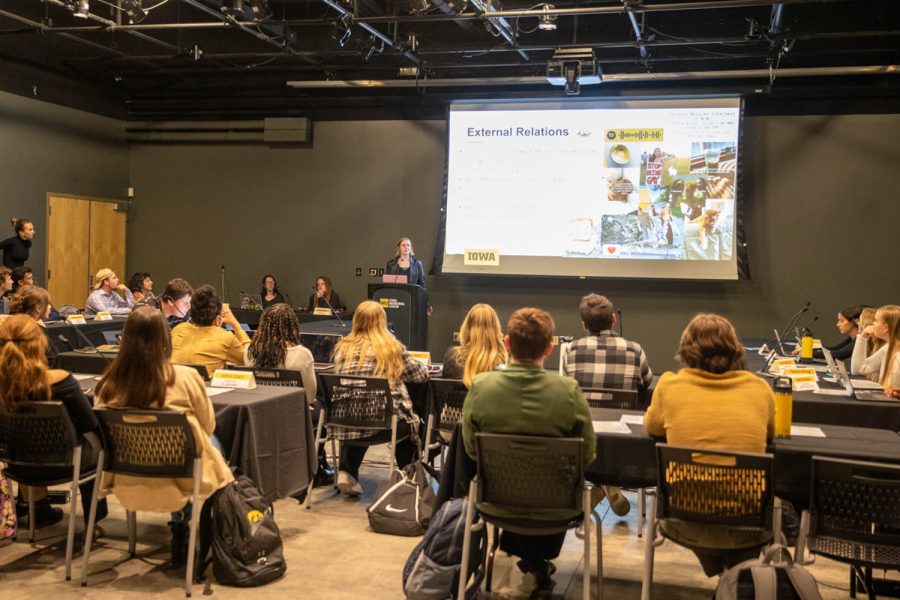UI USG to give $35,000 to university restorative justice program
UI Undergraduate Government will commit $35,000 to assist in the training for restorative justice.
Students meet during an Undergraduate Student Government meeting in the Black Box Theatre of the Iowa Memorial Union on Tuesday, Oct. 4, 2022.
December 7, 2022
The University of Iowa Undergraduate Student Government passed a resolution Tuesday to support the university’s Restorative Justice Program with over $30,000.
The resolution outlined the use of $35,000 from the USG contingency fund — which supports larger-scale projects that help university staff, students, and community — to help fund a three-day training with University of San Diego personnel.
The full cost of the program is expected to be greater than $35,000, but official calculations have not been completed as of the Dec. 6 meeting.
The legislation was introduced by Sen. Hannah Akey.
“The Office of Student Accountability is incorporating restorative justice practices, but there hasn’t been an increase in funding, and so in order to integrate these practices they need in-depth training to ensure that no additional harm is caused during the process,” Akey said.
Restorative justice works as a method of harm reduction and conflict resolution, Akey said.
Abigail Van Anden, UI assistant director for student accountability, said the goal is to train 80 to 100 people in restorative justice with these funds.
“That is a pretty good number for me to have on campus,” Van Anden said. “I think part of my success measuring that is going to be my retention of that 80 to 100 people.”
Van Anden said she’s excited to bring restorative justice because of her experience incorporating at smaller schools as well as its potential benefits from the program.
“In previous institutions when I implemented this, my repeat offender rates or recidivism rates went down by 80 percent,” Van Anden said.
Van Anden said restorative justice is meant to help an individual truly understand what happened and the harm they caused.
This is done through “circle work,” where participants sit in a circle and the party who did the harm can hear how they affected others.
“Restorative justice is not a new practice,” Van Anden said. “Restorative justice is something that has been used in indigenous tribes for centuries, largely through the United States, Canada, and New Zealand.”
Before questioning, Van Anden brought up a common criticism of restorative justice, which is that it is a conversation without any real consequences and is an easy way out.
“Easy way out is just coming in, taking this sanction, and moving on,” Van Anden said. “But also at the end of this there are going to be, there are consequences for poor behavior. And so that is also part of this process.”
RELATED: Ad Hoc Truth and Reconciliation Commission participate in healing restorative justice circles
Van Anden added that many departments and offices on campus — the Office of Student Accountability, Student Care Assistance, Threat Assessment, UI police, and the Office of Institutional Equity — have already started the training process.
“We want to expand that greater. We want to make sure that we’re able to talk with faculty that manage academic dishonesty or any kind of academic misconduct as well,” Van Anden said. “We want to get other folks in the community that want to be involved with this, want to be trained as facilitators for a circle so that we can have a robust office that is able to really execute this as often as we can.”
A goal for restorative justice is allowing students to reintegrate into communities they have hurt and for the community to be receptive to this reintegration, Van Anden said.
Van Anden said her next step after receiving funding is to inform students of restorative justice’s importance, how it applies to them, and the benefits of the approach.
“My ultimate major goal is I want to be doing circles all the time, and not just in Student Conduct,” Van Anden said. “Restorative justice is an excellent, excellent thing to use as preventative measures as well.”
Pushback to the idea of restorative justice, Van Anden said, comes from a place of not understanding restorative justice.
“I do say that as somebody who has went through restorative justice practice…I do say I found it kind of childish,” Sen. Kyle Clare said. “It just felt like there was no accountability.”
In response to Clare, multiple senators brought up the fact that restorative justice is opt-in, meaning it is not forced on anybody.
“So, I think we have to take into consideration that it doesn’t make sense to be calling a program unsuccessful if it’s currently in the pilot phase and still trying to be implemented,” Sen. Jaden Bartlett said.















